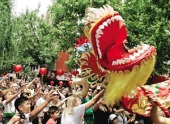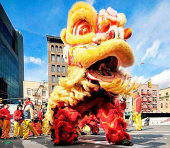China Overview
- Population: 1.3 billion
- Currency: yuan
- Guinness World Records: most people painting each other's faces simultaneously in one location (13,413), largest bottle of cooking oil (containing 3212 litres), most couples hugging (3009 couples).
- Internet users: 135 million
- Milk beer: from Inner Mongolia, an alternative to the traditional mare's-milk wine.
- Squirrel fish: whole mandarin fish deep-fried and manipulated to resemble a squirrel.
- Number of chinese characters: over 56,000
index Chinese Language Overseas
Nowadays, Chinese people and language is widely spread among the world. Traditionally, the Chinese immigrations are pioneers to spread Chinese languages internationality. With the increase international influence of Chinese, many foreigners learn of the Chinese language because of their love to Chinese culture and history. | |
| What is the overseas spoken Chinese? In many Chinatowns in the West, you often hear Cantonese being spoken. This is because Cantonese is a major dialect of Southern China where many early Chinese immigrants came from.
In Malaysia and Singapore, you can hear many different dialects being spoken, from Cantonese, Hokkien, Teochew to Cantonese.
| 
|
Though there are differences between languages, Chinese people communicate with each other with standard spoken Chinese. There are still debates on whether Chinese should be a family of Chinese dialect because even there are various languages, people can understand each others’ dialects with catching main words and guessing. |
What is basic information on Chinese language overseas?
The usage of Chinese languages by overseas Chinese has been determined by a large number of factors, including their ancestry, their migrant ancestors' "regime of origin", assimilation through generational changes, and official policies of their country of residence. The general trend is - increase of Mandarin-speaking Chinese among the new arrivals, making it the most common language of Chinatowns. |
How is Chinese language used in Southeast Asia?
Within Southeast Asia the language situation differs from the Chinese language overseas.
There are even some differences between the neighboring nations. On one hand, ethnic Chinese in Indonesia and Thailand had been subjected to official, and at times strict, assimilation policies, and as a result many of them are no longer proficient in the Chinese language. Luckily, Chinese who lived in Sumatra did not give up some of the dialects. Chinese Malaysians speak a wide variety of dialects, their prevalence being concentrated around particular metropolitan centers. Whereas in East Malaysia, Hakka and Mandarin are widely spoken, except in Sibu, where the Fuzhou dialect is predominant, and in Sandakan, where Cantonese is spoken. Regardless of locations, younger generations tend to speak Mandarin, which is taught in schools. |
| In Singapore, a nation with an ethnic Chinese majority population, Mandarin is recognized as one of its official languages, along with simplified Chinese characters. In contrast, the other overseas Chinese communities mostly used traditional Chinese characters until the 1990s, when nationals of the PRC began to emigrate in substantial numbers. Although ethnic Chinese in Singapore are predominantly of Hokkien descent, the government of Singapore discourages the usage of non-Mandarin dialects through the |  |
| Speak Mandarin Campaign. The Singapore government actively promotes English as the common language of the multiracial society. Younger Chinese Singaporeans are bilingual, with the tendency of speaking English. |
 | How are Chinese language used in North America? Many overseas Chinese populations in North America speak some variety of spoken Chinese. In the United States and Canada, Chinese is the third most spoken language. Cantonese has historically been the most popular variety because immigrants are mostly from Southern China from the 19th century up through the 1980s. |
In New York City, many of the Chinese people speak Cantonese. Even though Mandarin is the native languages, there are only ten percent of Chinese speakers. However, in the recent years, the Mandarin speakers are slowly starting to outgrow the Cantonese speakers. ? In Richmond, in the Greater Vancouver Area of Canada, 40% of the population is Chinese. Chinese words can be seen everywhere. In Vancouver, around 23% of the population is Chinese. Cantonese and Mandarin are the most popular ones. The Los Angeles area and Santa Clara County have particularly high numbers of Mandarin speakers, partly due to immigration from Taiwan. |
How are Chinese popularized overseas? Helping foreigners seek further education in China Overseas Chinese education policy has had a long history since the founding of the republic. In 1929, the Ministry of Education set up the Overseas Chinese Education Design Committee. Foreigners, from Southeast Asia, Japan, Korea, North America and Europe, are assisted in seeking further education in China. With more and more opened policies, foreign students come to China for | 
|
education become easier. Moreover, on holiday breaks, foreign students can join in some vacation education programs for studying. |
 | Establishing overseas schools
With the reform and opening-up policy, more foreigners get learn and experience the Chinese culture. There is a blossom of learning Chinese. In order to fulfill their desires of learning Chinese, Chinese government set up some schools abroad. The schools are in nature an extension of Chinese national education system. The most successful example is Confucius |
Institute. In America, there are 64 Confucius Institutes and 25 Confucius Classrooms. Many of schools would take a cooperative style. Recently, an Online Confucius Institute has been established made it convenient for foreign students to learn Chinese.? In a word, Chinese now is widely spread globally due to the hard works of Chinese immigrations and Chinese foreign learners. Chinese language should be a bridge to introduce Chinese traditional culture to the world, which will promote the international communication. |

HOTMost Popular Topics

There is no sincerer love than the love of food.

Because of its size, China has great climatic diversity. Generally, the best time to visit China is during spring and autumn.

Chinese is the most commonly used language in China, and one of the most commonly used languages in the world.

China has many traditional festivals, including the Spring Festival, the Lantern Festival, the Dragon Boat Festival.

In the Chinese zodiac, twelve animals are used to denote the year of a person's birth: rat, ox, tiger, rabbit, dragon.

China, one of the world's most ancient civilizations, has a recorded history of nearly 4,000 years..